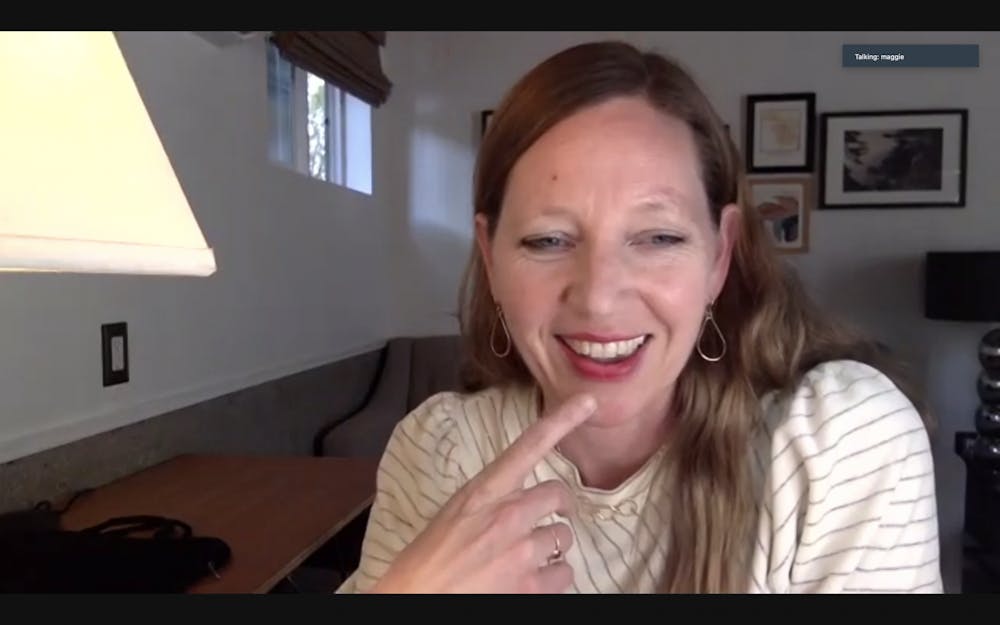“Story is not the only mode available to us in experiencing our lives.”
These are the words of award-winning poet, author and professor Maggie Nelson, who was featured in the latest installment of the Writing Seminars’ President’s Reading Series on Thursday, Feb. 25.
Professor Andrew Motion kicked off the event with an introduction recognizing Nelson, her work and her accomplishments. In addition to highlighting her writing career, Motion discussed his personal experiences with reading her writing.
Upon being introduced in such a way, Nelson herself vowed to take some of Motion’s words for her own use, like the term “well-ventilated” to describe language. She remarked that such conversations between writers play a major role in her writing.
“What we read is a form of autobiography,” she said.
Following this heartwarming exchange, Nelson quickly took on a more somber tone.
She began by reading a poem called “A Halo Over the Hospital” from her book Something Bright, Then Holes. She explained that this poem was about her close friend Christina Crosby, who died on Jan. 5.
Crosby featured in many of Nelson’s works. This reading was the first event Nelson took part in since Crosby’s passing, and she explained that it felt right for her to start by paying homage.
Indeed, even with her periodic eye contact with the webcam, this reading felt like a private conversation between Nelson and Crosby, present just outside the audience’s field of view. The vivid moments captured in the poem portrayed Crosby as having a heartbreakingly buoyant character, which Nelson assured her listeners remained constant until the end of her life.
Following the poetry reading, Nelson shifted to talking about her book On Freedom: Four Songs of Care and Constraint, which will be released later this year. The book was mostly written before the pandemic, but Nelson has been revisiting the work and adding in timely passages.
On Freedom is a book of cultural criticism that explores freedom through four avenues: art, sex, drugs and climate. At the Thursday evening event, Nelson chose to read parts of the beginning and the end of the chapter on climate.
The chapter opens with the flavor of memoir. Nelson describes her 3-year-old son in Travel Town, juggling the universal enthusiasm of a child and the complicity of a mother with historic social justice concerns and global environmental impacts stemming from steam engines.
Nelson’s bleak portrayal of the climate crisis is unlike other commentary on the subject because of her calls for mitigation and adaptation efforts rather than measures to reverse course; according to Nelson, we are strapped onto a runaway train, and there is no putting a stop to it.
Many writers have been calling for more stories about what the future may hold for our planet to scare ourselves and each other into drastic climate action. Nelson argues otherwise.
“Apocalyptic fantasy is an excuse,” she said.
Imagined futures — writers’ responses to our current moment — act as a balm because people want to know how stories end, how this story of climate change ends. Yet the simple truth is that we don’t know how the story ends, and we may never know in our lifetimes.
Instead, Nelson argued that we must ride the blinds. We must let go of our future-obsessed need for control and live in the present, embracing what she called “folded time.”
Living fully in the present intrinsically ties a person to the future, though. And knowing that the world will not end this very second makes it possible for one to let go of despair and to keep on with the activist mission.
Seeing the world as it is rather than how it might be is what ultimately drives climate action. So even though it seems counterintuitive at first, Nelson asks readers of her book to drop the storyline of the Anthropocene in order to make the world more habitable — not physically but by way of shifting our mindset toward it.
With this call to action, the reading transitioned into a question-and-answer period.
The first question came from Professor Nate Brown, who requested Nelson’s insights on her use of form: sometimes poetry and other times prose.
“‘Genre-busting’ sounds like a good time,” Nelson said.
However, she remarked that figuring out what form her writing should take is more akin to being at war with the will of her words.
In this vein, in response to moderator Kate Keleher’s question about the most challenging thing she’s written, Nelson said, “The writing should be a problem.”
Finally, in his closing remarks, Motion praised Nelson’s readings as disturbing yet all the more filled with life force because of it.
With decisive, riveting and disturbing language, Nelson suggested a new way of looking at the world for her audience to take or leave. Regardless of which option each person ultimately opted for, everyone surely left the reading as freer thinkers thanks to Nelson’s presentation of new thoughts on interpretations of and connections between old ideas.





